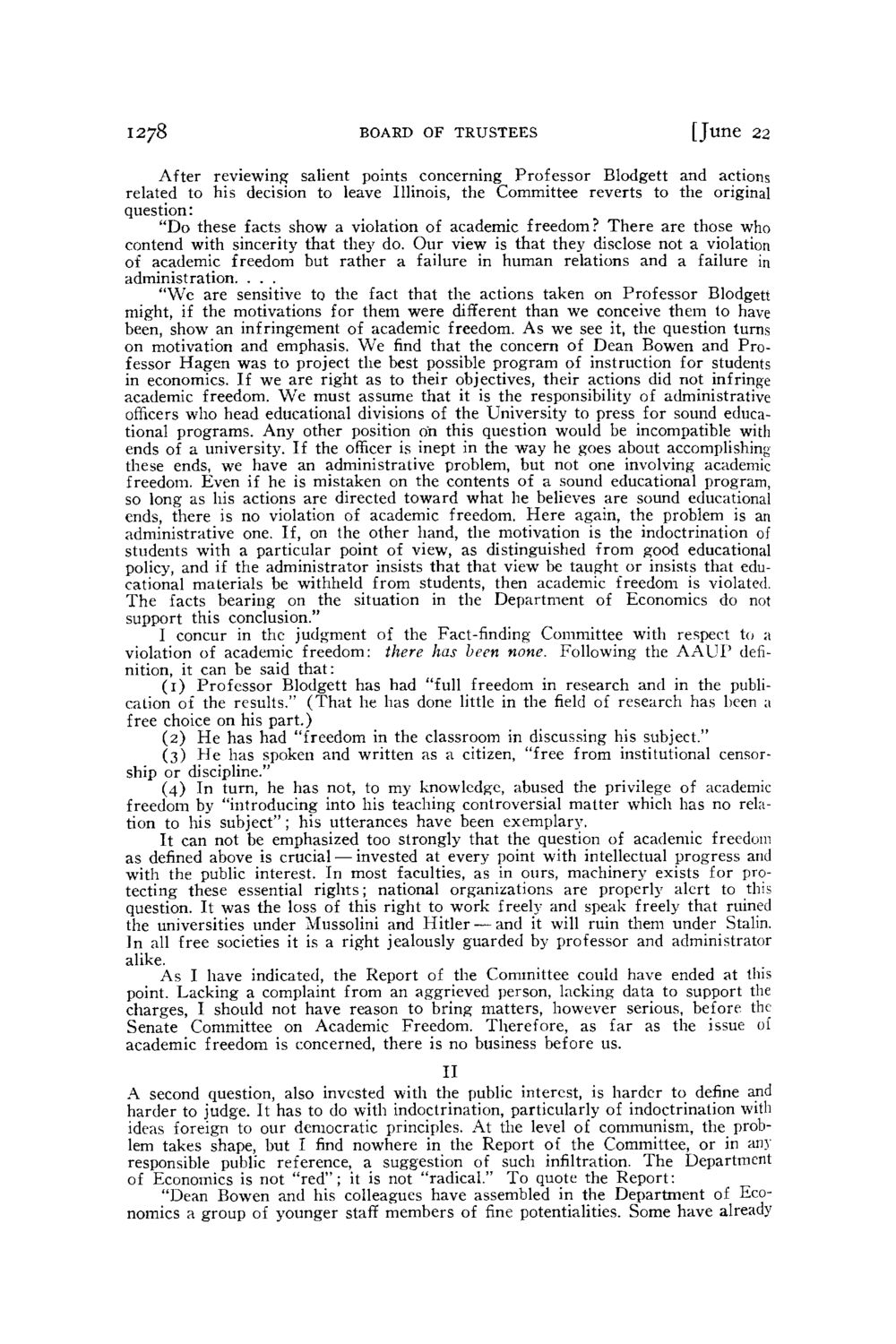| |
| |
Caption: Board of Trustees Minutes - 1950
This is a reduced-resolution page image for fast online browsing.

EXTRACTED TEXT FROM PAGE:
1278 BOARD OF TRUSTEES [June 22 After reviewing salient points concerning Professor Blodgett and actions related to his decision to leave Illinois, the Committee reverts to the original question: "Do these facts show a violation of academic freedom? There are those who contend with sincerity that they do. Our view is that they disclose not a violation of academic freedom but rather a failure in human relations and a failure in administration. . . . "We are sensitive to the fact that the actions taken on Professor Blodgett might, if the motivations for them were different than we conceive them to have been, show an infringement of academic freedom. As we see it, the question turns on motivation and emphasis. We find that the concern of Dean Bowen and Professor Hagen was to project the best possible program of instruction for students in economics. If we are right as to their objectives, their actions did not infringe academic freedom. W e must assume that it is the responsibility of administrative officers who head educational divisions of the University to press for sound educational programs. Any other position on this question would be incompatible with ends of a university. If the officer is inept in the way he goes about accomplishing these ends, we have an administrative problem, but not one involving academic freedom. Even if he is mistaken on the contents of a sound educational program, so long as his actions are directed toward what he believes are sound educational ends, there is no violation of academic freedom. Here again, the problem is an administrative one. If, on the other hand, the motivation is the indoctrination of students with a particular point of view, as distinguished from good educational policy, and if the administrator insists that that view be taught or insists that educational materials be withheld from students, then academic freedom is violated. The facts bearing on the situation in the Department of Economics do not support this conclusion." I concur in the judgment of the Fact-finding Committee with respect to a violation of academic freedom: there has been none. Following the A A U P definition, it can be said that: ( i ) Professor Blodgett has had "full freedom in research and in the publication of the results." (That he has done little in the field of research has been a free choice on his part.) (2) He has had "freedom in the classroom in discussing his subject." (3) H e has spoken and written as a citizen, "free from institutional censorship or discipline." (4) In turn, he has not, to my knowledge, abused the privilege of academic freedom by "introducing into his teaching controversial matter which has no relation to his subject" ; his utterances have been exemplary. It can not be emphasized too strongly that the question of academic freedom as defined above is crucial — invested at every point with intellectual progress and with the public interest. In most faculties, as in ours, machinery exists for protecting these essential rights; national organizations are properly alert to this question. It was the loss of this right to work freely and speak freely that ruined the universities under Mussolini and Hitler — and it will ruin them under Stalin. In all free societies it is a right jealously guarded by professor and administrator alike. As I have indicated, the Report of the Committee could have ended at this point. Lacking a complaint from an aggrieved person, lacking data to support the charges, I should not have reason to bring matters, however serious, before the Senate Committee on Academic Freedom. Therefore, as far as the issue of academic freedom is concerned, there is no business before us. II A second question, also invested with the public interest, is harder to define and harder to judge. It has to do with indoctrination, particularly of indoctrination with ideas foreign to our democratic principles. At the level of communism, the problem takes shape, but I find nowhere in the Report of the Committee, or in any responsible public reference, a suggestion of such infiltration. The Department of Economics is not "red"; it is not "radical." To quote the Report: "Dean Bowen and his colleagues have assembled in the Department of Economics a group of younger staff members of fine potentialities. Some have already
| |